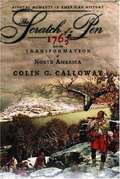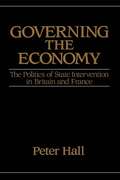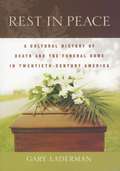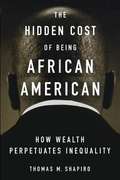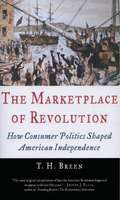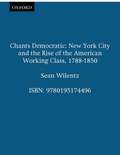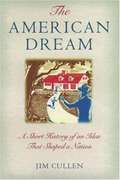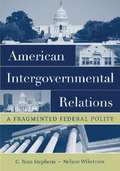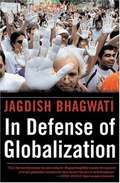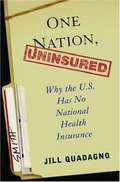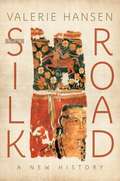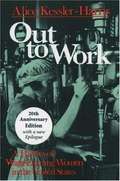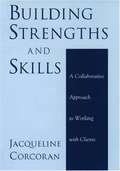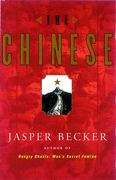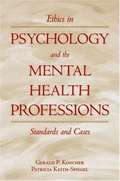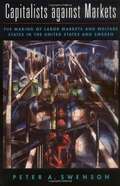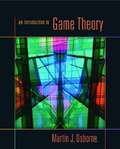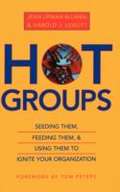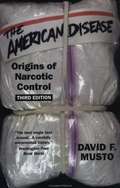- Table View
- List View
The Fat Tail: The Power of Political Knowledge for Strategic Investing
by Ian Bremmer Preston KeatWritten by two of the world's leading figures in political risk management, "The Fat Tail" reveals that while the world remains exceedingly risky for businesses, it is by no means incomprehensible.
The Great Depression and the New Deal: A Very Short Introduction
by Eric RauchwayThe New Deal shaped our nation's politics for decades, and was seen by many as tantamount to the "American Way" itself. Now, in this superb compact history, Eric Rauchway offers an informed account of the New Deal and the Great Depression, illuminating its successes and failures. Rauchway first describes how the roots of the Great Depression lay in America's post-war economic policies--described as "laissez-faire with a vengeance"--which in effect isolated our nation from the world economy just when the world needed the United States most. He shows how the magnitude of the resulting economic upheaval, and the ineffectiveness of the old ways of dealing with financial hardships, set the stage for Roosevelt's vigorous (and sometimes unconstitutional) Depression-fighting policies. Indeed, Rauchway stresses that the New Deal only makes sense as a response to this global economic disaster. The book examines a key sampling of New Deal programs, ranging from the National Recovery Agency and the Securities and Exchange Commission, to the Public Works Administration and Social Security, revealing why some worked and others did not. In the end, Rauchway concludes, it was the coming of World War II that finally generated the political will to spend the massive amounts of public money needed to put Americans back to work. And only the Cold War saw the full implementation of New Deal policies abroad--including the United Nations, the World Bank, and the International Monetary Fund. Today we can look back at the New Deal and, for the first time, see its full complexity. Rauchway captures this whole in a remarkably short space, making this book an ideal introduction to one of the great policy revolutions in history.
The Scratch of a Pen: 1763 and the Transformation of North America (Pivotal moments in American history)
by Colin G. CallowayIn this superb volume in Oxford's acclaimed Pivotal Moments series, Colin Calloway reveals how the Treaty of Paris of 1763 had a profound effect on American history, setting in motion a cascade of unexpected consequences, as Indians and Europeans, settlers and frontiersmen, all struggled to adapt to new boundaries, new alignments, and new relationships.
Governing the Economy: The Politics of State Intervention in Britain and France (Europe And The International Order Ser.)
by Peter A. HallFor over one hundred years, the British economy has been in decline relative to other industrialized countries. <p><p>This book explores the origins of Britain's economic problems and develops a striking new argument about the sources of decline. It goes on to analyze the evolution of economic policy in postwar Britain from the development of Keynesianism to the rise of monetarism under Margaret Thatcher. France, by contrast, experienced an economic miracle in the postwar period. <p><p>Hall argues that the French state transformed itself and then its society through an extensive system of state intervention. In the recent period, however, the French system has encountered many difficulties, and the book locates their sources in the complex interaction between state and society in France culminating in the socialist experiment of Francois Mitterrand. <p><p>Through his insightful, comparative examination of policy-making in Britain and France, Hall develops a new approach to state-society relations that emphasizes the crucial role of institutional structures.
Rest in Peace: A Cultural History of Death and the Funeral Home in Twentieth-Century America
by Gary LadermanThough it has often been passionately criticized--as fraudulent, exploitative, even pagan--the American funeral home has become nearly as inevitable as death itself, an institution firmly embedded in our culture. But how did the funeral home come to hold such a position? What is its history? And is it guilty of the charges sometimes leveled against it? In Rest in Peace, Gary Laderman traces the origins of American funeral rituals, from the evolution of embalming techniques during and after the Civil War and the shift from home funerals to funeral homes at the turn of the century, to the increasing subordination of priests, ministers, and other religious figures to the funeral director throughout the twentieth century. In doing so he shows that far from manipulating vulnerable mourners, as Jessica Mitford claimed in her best-selling The American Way of Death (1963), funeral directors are highly respected figures whose services reflect the community's deepest needs and wishes. Indeed, Laderman shows that funeral directors generally give the people what they want when it is time to bury our dead. He reveals, for example, that the open casket, often criticized as barbaric, provides a deeply meaningful moment for friends and family who must say goodbye to their loved one. But he also shows how the dead often come back to life in the popular imagination to disturb the peace of the living. Drawing upon interviews with funeral directors, major historical events like the funerals of John F. Kennedy and Rudolf Valentino, films, television, newspaper reports, proposals for funeral reform, and other primary sources, Rest in Peace cuts through the rhetoric to show us the reality--and the real cultural value--of the American funeral.
The Hidden Cost of Being African American: How Wealth Perpetuates Inequality
by Thomas M. ShapiroOver the past three decades, racial prejudice in America has declined significantly and many African American families have seen a steady rise in employment and annual income. But alongside these encouraging signs, Thomas Shapiro argues in The Hidden Cost of Being African American, fundamental levels of racial inequality persist, particularly in the area of asset accumulation--inheritance, savings accounts, stocks, bonds, home equity, and other investments. Shapiro reveals how the lack of these family assets along with continuing racial discrimination in crucial areas like home ownership dramatically impact the everyday lives of many black families, reversing gains earned in schools and on jobs, and perpetuating the cycle of poverty in which far too many find themselves trapped. Shapiro uses a combination of in-depth interviews with almost 200 families from Los Angeles, Boston, and St. Louis, and national survey data with 10,000 families to show how racial inequality is transmitted across generations. We see how those families with private wealth are able to move up from generation to generation, relocating to safer communities with better schools and passing along the accompanying advantages to their children. At the same time those without significant wealth remain trapped in communities that don't allow them to move up, no matter how hard they work. Shapiro challenges white middle class families to consider how the privileges that wealth brings not only improve their own chances but also hold back people who don't have them. This "wealthfare" is a legacy of inequality that, if unchanged, will project social injustice far into the future. Showing that over half of black families fall below the asset poverty line at the beginning of the new century, The Hidden Cost of Being African American will challenge all Americans to reconsider what must be done to end racial inequality.
The Marketplace of Revolution: How Consumer Politics Shaped American Independence
by T. H. Breen(back of book) Winner of the 2004 Society of Colonial Wars Book Award The Marketplace of Revolution offers a bold interpretation of the mobilization of ordinary Americans on the eve of independence. In a rich narrative that weaves insights into a changing material culture with analysis of popular political protests, Breen shows how virtual strangers managed to communicate a sense of trust that effectively united men and women long before they had established a nation of their own. The boycott movement - the signature of American resistance - invited colonists traditionally excluded from formal political processes to voice their opinions about liberty and rights within a revolutionary marketplace, an open, raucous public forum that defined itself around street protests, destruction of imported British goods, and incendiary newspaper exchanges. Within these exchanges was born a new form of politics in which ordinary men and women - precisely the people most often overlooked in traditional accounts of revolution - experienced an exhilarating surge of empowerment. The Marketplace of Revolution explains how at a moment of political crisis Americans gave political meaning to the pursuit of happiness and learned how to make goods speak to power.
Multinational Corporations And Foreign Direct Investment: Avoiding Simplicity, Embracing Complexity
by Stephen D. CohenForeign direct investment (FDI) and multinational corporations (MNCs)--for better and worse--play a large and growing role in shaping our world. The integrating thesis of this book is the inevitability of heterogeneity in FDI and MNCs and, accordingly, the imperative of disaggregation. Large companies doing business on a global basis increasingly dominate the production and marketing of the world's goods and services. The importance of these companies continues to grow while the debate about their nature and effects remains mired in a long-standing stalemate couched in strong black and white terms. Stephen D. Cohen seeks to reconcile this impasse by analyzing multinational corporations and foreign direct investment in an eclectic, nuanced manner. The core thesis is that an accurate understanding of the nature and impact of these phenomena comes from acknowledging the dominance of heterogeneity, perceptions, and ambiguity and the paucity of universal truths. This approach should contribute significantly to both a better academic understanding and a more productive policy debate of an increasingly important element of the world economy.
The Knowing Organization: How Organizations Use Information to Construct Meaning, Create Knowledge, and Make Decisions
by Chun Wei ChooIntegrating new research and examples throughout, the second edition of The Knowing Organization links the broad areas of organizational behavior and information management. It looks at how organizations behave as information-seeking, information-creating, and information-using communities and introduces a unifying framework to show how organizations create meaning, knowledge, and action. The book provides a model of how organizations use information strategically to adapt to external change and to foster internal growth. This model examines how people and groups within organizations use information to create an identity and a shared context for action and reflection; to develop new knowledge and new capabilities; and to make decisions that commit resources and capabilities to purposeful action. The second edition features new and expanded chapters on information failures, organizational learning, knowledge creation, and information-seeking behavior. The Knowing Organization, Second Edition, is ideal for graduate courses in information science, organizational behavior, organizational communications, and management information systems.
Chants Democratic: New York City and the Rise of the American Working Class, 1788-1850 (20th Anniversary Edition)
by Sean WilentzSince its publication in 1984,Chants Democratic has endured as a classic narrative on labor and the rise of American democracy. In it, Sean Wilentz explores the dramatic social and intellectual changes that accompanied early industrialization in New York. He provides a panoramic chronicle of New York City's labor strife, social movements, and political turmoil in the eras of Thomas Jefferson and Andrew Jackson. Twenty years after its initial publication, Wilentz has added a new preface that takes stock of his own thinking, then and now, about New York City and the rise of the American working class.
The American Dream: A Short History of an Idea That Shaped a Nation
by Jim CullenThis book explores a few varieties of the American Dream: their origins, their dynamics, their ongoing relevance. It does so by describing a series of specific American dreams in a loosely chronological, overlapping order.
American Intergovernmental Relations: A Fragmented Federal Polity
by G. Ross Stephens Nelson WikstromThe one constant in the American federal system is change--change that is not always beneficial. American Intergovernmental Relations: A Fragmented Federal Polity examines how the dynamic social, economic, and political forces that impinge on American government at all levels shape the waythat our federal system functions. Stephens and Wikstrom--both senior scholars specializing in federalism, intergovernmental relations, and fiscal policy--offer concise, comprehensive, and easy-to-understand coverage of these materials. Beginning with the key elements of federalism, the authors trace these principles as they haveevolved since the founding of the republic and through the various phases and types of federal arrangements as they exist today. They examine and analyze the extreme complexity of the system and the cooperative and conflicting components of vertical and horizontal intergovernmental relations. Stephens and Wikstrom also discuss the impact of public policy and intergovernmental relations on American society in light of rising globalism, rapidly changing technology, and new security concerns. Featuring relevant case studies from the headlines, American Intergovernmental Relations is anideal text for undergraduate and graduate courses in federalism and intergovernmental relations. It is also an excellent text for a different approach to a course in American government.
In Defense of Globalization
by Jagdish BhagwatiPassionate defense of economic and social aspects of globalization.
One Nation, Uninsured: Why The U.s. Has No National Health Insurance
by Jill S. QuadagnoEvery industrial nation in the world guarantees its citizens access to essential health care services--every country, that is, except the United States. In fact, one in eight Americans--a shocking 43 million people--do not have any health care insurance at all. One Nation, Uninsured offers a vividly written history of America's failed efforts to address the health care needs of its citizens. Covering the entire twentieth century, Jill Quadagno shows how each attempt to enact national health insurance was met with fierce attacks by powerful stakeholders, who mobilized their considerable resources to keep the financing of health care out of the government's hands. Quadagno describes how at first physicians led the anti-reform coalition, fearful that government entry would mean government control of the lucrative private health care market. Doctors lobbied legislators, influenced elections by giving large campaign contributions to sympathetic candidates, and organized "grassroots" protests, conspiring with other like-minded groups to defeat reform efforts. As the success of Medicare and Medicaid in the mid-century led physicians and the AMA to start scaling back their attacks, the insurance industry began assuming a leading role against reform that continues to this day. One Nation, Uninsured offers a sweeping history of the battles over health care. It is an invaluable read for anyone who has a stake in the future of America's health care system.
The Silk Road: A New History
by Valerie HansenThe Silk Road is as iconic in world history as the Colossus of Rhodes or the Suez Canal. But what was it, exactly? It conjures up a hazy image of a caravan of camels laden with silk on a dusty desert track, reaching from China to Rome. The reality was different--and far more interesting--as revealed in this new history. In The Silk Road, Valerie Hansen describes the remarkable archeological finds that revolutionize our understanding of these trade routes. For centuries, key records remained hidden-sometimes deliberately buried by bureaucrats for safe keeping. But the sands of the Taklamakan Desert have revealed fascinating material, sometimes preserved by illiterate locals who recycled official documents to make insoles for shoes or garments for the dead. Hansen explores seven oases along the road, from Xi'an to Samarkand, where merchants, envoys, pilgrims, and travelers mixed in cosmopolitan communities, tolerant of religions from Buddhism to Zoroastrianism. There was no single, continuous road, but a chain of markets that traded between east and west. China and the Roman Empire had very little direct trade. China's main partners were the peoples of modern-day Iran, whose tombs in China reveal much about their Zoroastrian beliefs. Silk was not the most important good on the road; paper, invented in China before Julius Caesar was born, had a bigger impact in Europe, while metals, spices, and glass were just as important as silk. Perhaps most significant of all was the road's transmission of ideas, technologies, and artistic motifs. The Silk Road is a fascinating story of archeological discovery, cultural transmission, and the intricate chains across Central Asia and China.
Out to Work: A History Of Wage-earning Women in the United States
by Alice Kessler-HarrisBasing her observations upon the personal experience of individual American women set against the backdrop of American society, Alice Kessler-Harris examines the effects of class, ethnic and racial patterns, changing perceptions of wage work for women, and the relationship between wage-earning and family roles.
Out to Work: A History of Wage-Earning Women in the United States
by Alice Kessler-HarrisBasing her observations upon the personal experience of individual American women set against the backdrop of American society, Alice Kessler-Harris examines the effects of class, ethnic and racial patterns, changing perceptions of wage work for women, and the relationship between wage-earning and family roles.
Europe, 1648-1815: From the Old Regime to the Age of Revolution
by Robin W. Winks Thomas E. KaiserEurope, 1648-1815 is a concise narrative of an exciting age in the history of Europe. It surveys the political, economic, social, and cultural events of the period, from the rise of absolutism to the campaigns of Napoleon, and from the creation of a European empire in the Americas to thecontroversies of the Enlightenment. Although informed by recent works on social history and political culture, the book has a strong political backbone, making it a text that can either stand alone or be supplemented by more specialized reading. It contains numerous illustrations, selections from primary sources, and a detailed, updated bibliography.
Building Strengths and Skills: A Collaborative Approach to Working with Clients
by Jacqueline CorcoranThis is a much-needed practice book that demonstrates how helping professionals can emphasize their clients' resilience, strength, and capacities, rather than focusing on pathology or deficits. It offers an integrative practice model for both assessment and intervention that interweaves strengths-based (specifically solution-focused therapy and motivational interviewing) and skills-building (cognitive-behavioral) approaches. In the strengths-and-skills-based model, helping professionals assume that clients possess the necessary capacities to solve their own problems, transforming the therapeutic relationship into a collaboration focused on bolstering motivation and resources for change. When these resources are exhausted or when deficits become a substantial barrier, then practitioner and client work to develop an individualized skills-building plan. A wide range of examples, written by Jacqueline Corcoran with experts from different fields of practice, clearly demonstrate how the model can be applied to individuals and families struggling with behavior problems, depression, substance abuse, anxiety, violence, and abuse, so that both strengths and skills maximize the client's success. This innovative, dynamic resource is a must have for practitioners across the helping, social service, and mental health professions.
The Chinese
by Jasper BeckerThis is the hidden story of people of the world's largest nation--so poorly understood and so vital to the future. It exposes the Chinese society in all of its layers: from remote, illiterate peasants; to the rising classes of businessmen.
Ethics in Psychology and the Mental Health Professions: Standards and Cases (3rd edition)
by Gerald P. Koocher Patricia Keith-SpiegelWe seek to present the full range of contemporary ethical issues in the mental health professions, not only as relevant and intriguing but also as integral and unavoidable aspects of the our complex professional roles and social responsibilities. Regardless of one's training speciality or the work setting, critical dilemmas will arise -- probably with some regularity--and we will often need to make challenging decisions or take intervention steps, sometimes right on the spot.
Capitalists Against Markets: The Making Of Labor Markets And Welfare States In The United States And Sweden
by Peter A. SwensonConventional wisdom argues that welfare state builders in the US and Sweden in the 1930s took their cues from labor and labor movements. Swenson makes the startling argument that pragmatic social reformers looked for support not only from below but also from above, taking into account capitalist interests and preferences. Juxtaposing two widely recognized extremes of welfare, the US and Sweden, Swenson shows that employer interests played a role in welfare state development in both countries.
An Introduction to Game Theory
by Martin J. OsborneAn Introduction to Game Theory, by Martin J. Osborne, presents the main principles of game theory and shows how they can be used to understand economic, social, political, and biological phenomena. The book introduces in an accessible manner the main ideas behind the theory rather than their mathematical expression. All concepts are defined precisely, and logical reasoning is used throughout. The book requires an understanding of basic mathematics but assumes no specific knowledge of economics, political science, or other social or behavioral sciences. <p><p>Coverage includes the fundamental concepts of strategic games, extensive games with perfect information, and coalitional games; the more advanced subjects of Bayesian games and extensive games with imperfect information; and the topics of repeated games, bargaining theory, evolutionary equilibrium, rationalizability, and maxminimization. The book offers a wide variety of illustrations from the social and behavioral sciences and more than 280 exercises. Each topic features examples that highlight theoretical points and illustrations that demonstrate how the theory may be used. Explaining the key concepts of game theory as simply as possible while maintaining complete precision, An Introduction to Game Theory is ideal for undergraduate and introductory graduate courses in game theory.
Hot Groups
by Jean Lipman-Blumen Harold J. LeavittRigid, old corporate styles, like the inflexible steel and stone headquarters that symbolized them, are fast becoming quaint vestiges of things past. Many of today's managers are beginning to understand that encouraging some behaviors at the edge of accepted organizational propriety can actually help their companies achieve success in this new competitive environment. And hot groups are helping organizations do just that. Based on years of observing and participating in hot groups, the authors describe the conditions under which such groups flourish, the behaviors they exhibit, the type of leadership they require, and the benefits they bring. For those executives who believe that more hot groups might help stir the hearts and minds of their people, there remains the question of how to make them happen. The authors offer suggestions that managers can follow to create an environment fertile enough to allow hot groups to grow.
The American Disease
by David F. MustoThe American Disease is a classic study of the development of drug laws in the United States.


